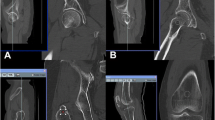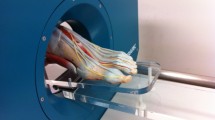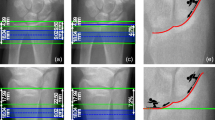Abstract
Summary
Few studies have investigated factors influencing the precision of peripheral quantitative computed tomography (pQCT) measures. This study found time between repeat scans and subject anthropometric characteristics to influence short-term precision of pQCT-derived measures in the lower leg. These findings have implications for both investigators and clinicians utilizing pQCT outcomes.
Introduction
Peripheral quantitative computed tomography (pQCT) is increasingly being used to investigate musculoskeletal changes associated with age, disease and/or intervention. Precision of pQCT measures is of paramount importance in this endeavor. This study aimed to establish the short-term precision of pQCT-derived musculoskeletal measures of the lower leg and investigate factors influencing this precision.
Methods
Thirty healthy subjects had a series of six pQCT scans of the lower leg (66% of tibial length proximal from its distal end) performed on two separate days by two different testers. The influences of different testers, time between repeat scans, and subject anthropometric characteristics on precision were explored.
Results
Overall precision error (root mean square) increased from bone (<1%) to muscle (<1.5%) to fat (3%). The two testers were equally precise in performing pQCT measures; however, precision error increased when repeat scans were repeated 1 week apart as opposed to on the same day. Subject anthropometric characteristics influenced precision errors with the general finding being that an increase in subject size was associated with less precise pQCT measures.
Conclusions
pQCT is a relatively precise technique for the assessment of bone and muscle, but precision is influenced by time between repeat scans and subject anthropometric characteristics. Investigators and clinicians need to be aware of these factors influencing pQCT outcomes as they may influence statistical power in clinical studies and the characterization of change in individual patients.
Similar content being viewed by others

References
Hughes VA, Frontera WR, Roubenoff R, Evans WJ, Singh MAF (2002) Longitudinal changes in body composition in older men and women: role of body weight change and physical activity. Am J Clin Nutr 76:473–481
Riggs BL, Wahner HW, Melton LJ 3rd, Richelson LS, Judd HL, Offord KP (1986) Rates of bone loss in the appendicular and axial skeletons of women: evidence of substantial vertebral bone loss before menopause. J Clin Invest 77:1487–1491
Sehl ME, Yates FE (2001) Kinetics of human aging: I. Rates of senescence between ages 30 and 70 years in healthy people. J Gerontol Ser A Biol Sci Med Sci 56A:B198–B208
World Health Organization (2007) WHO global report on falls prevention in older age. Switzerland, Geneva, p 53
Russo CA, Holmquist L, Elixhauser A (2009) U.S. hospitalizations involving osteoporosis and injury, 2006. HCUP Statistical Brief #76. Rockville, MD, p 12
Pahor M, Manini T, Cesari M (2009) Sarcopenia: clinical evaluation, biological markers and other evaluation tools. J Nutr Health Aging 13:724–728
Roldán EJ, Bogado CE (2009) Assessment of material, structural, and functional properties of the human skeleton by pQCT systems. Curr Osteoporos Rep 7:37–41
Groll O, Lochmüller EM, Bachmeier M, Willnecker J, Eckstein F (1999) Precision and intersite correlation of bone densitometry at the radius, tibia and femur with peripheral quantitative CT. Skeletal Radiol 28:696–702
Rittweger J, Felsenberg D (2009) Recovery of muscle atrophy and bone loss from 90 days bed rest: results from a one-year follow-up. Bone 44:214–224
Sievänen H, Koskue V, Rauhio A, Kannus P, Heinonen A, Vuori I (1998) Peripheral quantitative computed tomography in human long bones: evaluation of in vitro and in vivo precision. J Bone Miner Res 13:871–882
Burrows M, Cooper DM, Liu D, McKay HA (2009) Bone and muscle parameters of the tibia: agreement between the XCT 2000 and XCT 3000 instruments. J Clin Densitom 12:186–194
Creamer KW, Burner KL, Herbert WG (2008) Short term precision of peripheral quantitative computed tomography for hard and soft tissue measurements at mid-shaft and distal regions of the tibia. J Clin Densitom 11:466, abstract
Gordon CL, Webber CE, Beaumont LF (2003) Accuracy and precision error of muscle cross-sectional area measured using peripheral quantitative computed tomography in adults. J Bone Miner Res 18(Suppl 2):333 (abstract)
Rittweger J, Beller G, Ehrig J, Jung C, Koch U, Ramolla J, Schmidt F, Newitt D, Majumdar S, Schiessl H, Felsenberg D (2000) Bone-muscle strength indices for the human lower leg. Bone 27:319–326
Ronkainen PH, Pollanen E, Tormakangas T, Tiainen K, Koskenvuo M, Kaprio J, Rantanen T, Sipila S, Kovanen V (2008) Catechol-O-methyltransferase gene polymorphism is associated with skeletal muscle properties in older women alone and together with physical activity. PLoS ONE 3:e1819
Xu L, Nicholson P, Wang Q, Alén M, Cheng S (2009) Bone and muscle development during puberty in girls: a 7-year longitudinal study. J Bone Miner Res 24:1693–1698
Glüer CC, Blake G, Lu Y, Blunt BA, Jergas M, Genant HK (1995) Accurate assessment of precision errors: how to measure the reproducibility of bone densitometry techniques. Osteoporos Int 5:262–270
Baim S, Wilson CR, Lewiecki EM, Luckey MM, Downs RW Jr, Lentle BC (2005) Precision assessment and radiation safety for dual-energy X-ray absorptiometry: position paper of the international society for clinical densitometry. J Clin Densitom 8:371–378
Glüer CC (1999) Monitoring skeletal changes by radiological techniques. J Bone Miner Res 14:1952–1962
Binkley TL, Specker BL (2008) Muscle-bone relationships in the lower leg of healthy pre-pubertal females and males. J Musculoskelet Neuronal Interact 8:239–243
Burnham JM, Shults J, Dubner SE, Sembhi H, Zemel BS, Leonard MB (2008) Bone density, structure, and strength in juvenile idiopathic arthritis: importance of disease severity and muscle deficits. Arthritis Rheum 58:2518–2527
Ducher G, Bass SL, Naughton GA, Eser P, Telford RD, Daly RM (2009) Overweight children have a greater proportion of fat mass relative to muscle mass in the upper limbs than in the lower limbs: implications for bone strength at the distal forearm. Am J Clin Nutr 90:1104–1111
Eser P, Hill B, Ducher G, Bass S (2009) Skeletal benefits after long-term retirement in former elite female gymnasts. J Bone Miner Res 24:1981–1988
Felin EM, Prahalad S, Askew EW, Moyer-Mileur LJ (2007) Musculoskeletal abnormalities of the tibia in juvenile rheumatoid arthritis. Arthritis Rheum 56:984–994
Macdonald H, Kontulainen S, Petit M, Janssen P, McKay H (2006) Bone strength and its determinants in pre- and early pubertal boys and girls. Bone 39:598–608
Runge M, Rittweger J, Russo CR, Schiessl H, Felsenberg D (2004) Is muscle power output a key factor in the age-related decline in physical performance? A comparison of muscle cross section, chair-rising test and jumping power. Clin Physiol Funct Imaging 24:335–340
Wetzsteon RJ, Petit MA, Macdonald HM, Hughes JM, Beck TJ, McKay HA (2008) Bone structure and volumetric BMD in overweight children: a longitudinal study. J Bone Miner Res 23:1946–1953
Gere JM, Timoshenko S (1984) Mechanics of materials. PWS-Kent, Boston
Warden SJ, Bogenschutz ED, Smith HD, Gutierrez AR (2009) Throwing induces substantial torsional adaptation within the midshaft humerus of male baseball players. Bone 45:931–941
Fuleihan GE, Testa MA, Angell JE, Porrino N, Leboff MS (1995) Reproducibility of DXA absorptiometry: a model for bone loss estimates. J Bone Miner Res 10:1004–1014
Leslie WD (2008) Factors affecting short-term bone density precision assessment and the effect on patient monitoring. J Bone Miner Res 23:199–204
Sun LW, Beller G, Felsenberg D (2009) Quantification of bone mineral density precision according to repositioning errors in peripheral quantitative computed tomography (pQCT) at the radius and tibia. J Musculoskelet Neuronal Interact 9:18–24
Engelke K, Adams JE, Armbrecht G, Augat P, Bogado CE, Bouxsein ML, Felsenberg D, Ito M, Prevrhal S, Hans DB, Lewiecki EM (2008) Clinical use of quantitative computed tomography and peripheral quantitative computed tomography in the management of osteoporosis in adults: the 2007 ISCD official positions. J Clin Densitom 11:123–162
Baim S, Binkley N, Bilezikian JP, Kendler DL, Hans DB, Lewiecki EM, Silverman S (2008) Official positions of the international society for clinical densitometry and executive summary of the 2007 ISCD position development conference. J Clin Densitom 11:75–91
Zemel B, Bass S, Binkley T, Ducher G, Macdonald H, McKay H, Moyer-Mileur L, Shepherd J, Specker B, Ward K, Hans D (2008) Peripheral quantitative computed tomography in children and adolescents: the 2007 ISCD pediatric official positions. J Clin Densitom 11:59–74
Leslie WD, Moayyeri A, Program Manitoba Bone Density (2006) Minimum sample size requirements for bone density precision assessment produce inconsistency in clinical monitoring. Osteoporos Int 17:1673–1680
Ashe MC, Liu-Ambrose T, Khan KM, White N, McKay HA (2005) Optimizing results from pQCT: reliability of operator-dependent pQCT variables in cadavers and humans with low bone mass. J Clin Densitom 8:335–340
Conflicts of interest
None.
Author information
Authors and Affiliations
Corresponding author
Rights and permissions
About this article
Cite this article
Swinford, R.R., Warden, S.J. Factors affecting short-term precision of musculoskeletal measures using peripheral quantitative computed tomography (pQCT). Osteoporos Int 21, 1863–1870 (2010). https://doi.org/10.1007/s00198-009-1151-3
Received:
Accepted:
Published:
Issue Date:
DOI: https://doi.org/10.1007/s00198-009-1151-3



